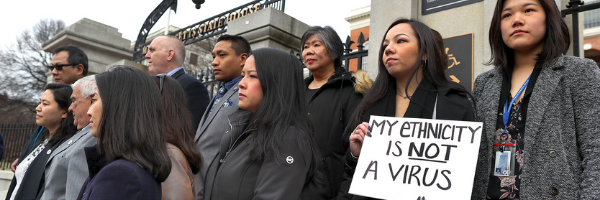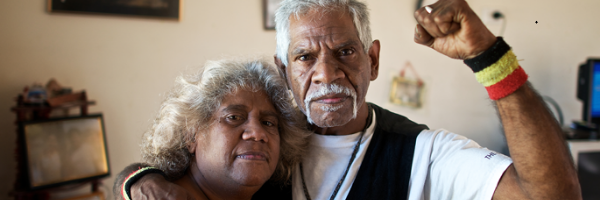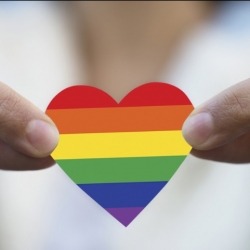Community update: COVID-19 (June 2020)
Commission News
June 2020
Commissioner update COVID-19
Dear friends,
The last few weeks have seen a gradual return to some of our pre-pandemic freedoms in many parts of Australia. While physical distancing remains a vital element to maintaining low infection rates, it is clear that we welcome the opportunity to visit loved ones, travel and socialise.
The Lucky Country, a term used favourably to refer to Australia since Donald Horne’s book hit the shelves in 1964, has proved true once again. We have been spared the worst impacts of COVID-19, while watching other advanced nations face dire consequences. Nonetheless, every life lost is a tragedy, and the road to recovery will be challenging for all of us.
Over the past month, the Australian Human Rights Commission has maintained our focus on monitoring and addressing the human rights impacts of COVID-19 and the measures to contain it, as well as our ongoing work across all areas of discrimination, to ensure your freedoms and rights are protected and upheld.
In this month's issue, Race Discrimination Commissioner Chin Tan gives an update on the spike in racism targeting Asian Australians during COVID-19, and Social Justice Commissioner June Oscar AO provides her thoughts on why we need structural reform, and a new agreement with Aboriginal and Torres Strait Islander communities post COVID-19.
I have continued to work on our National Conversation on Human Rights project, and the Commission is due to release a draft reform agenda on human rights later this year. As part of this work, the Commission has been exploring proposals to make Australia’s human rights system more effective. We recently held an expert ‘virtual roundtable’ in partnership with Associate Professor Julie Debeljak of the Castan Centre on Human Rights at Monash University, and Associate Professor Laura Grenfell of the Public Law and Policy Research Unit at the University of Adelaide, on Australia’s human rights scrutiny mechanisms to generate input for this reform agenda.
Human Rights Commissioner Edward Santow has been working with government agencies, civil society groups and other stakeholders on some of the emerging COVID-19 issues for vulnerable groups such as asylum seekers, temporary visa holders and international students. The Commission also released its position, as the COVIDSafe App legislation was being considered in Parliament.
Age Discrimination Commissioner Dr Kay Patterson AO has been talking to frontline services, health and social care peak bodies, and businesses about the effects of COVID-19 on older people in Australia. Commissioner Patterson is preparing for World Elder Abuse Awareness Day (WEAAD) on Monday 15 June, when she will be taking part in webinars and online events with COTA Tasmania, Advocare WA, Seniors Rights NSW and Aged Rights Advocacy Service SA.
Disability Discrimination Commissioner Dr Ben Gauntlett continues his important work as a member of the Federal Government’s Advisory Committee on Health Emergency Response to Coronavirus (COVID-19) for People with Disability. Commissioner Gauntlett is also participating in broader national and international discussions about protecting the rights of people with disability in the context of the pandemic. In May he addressed the Columbia Law School Human Rights Institute on the importance of including people with disability in the policy decision-making framework for COVID-19 recovery. You can read his speech in full here.
Sex Discrimination Commissioner Kate Jenkins has continued her advocacy for evidence-based gender-sensitive policy and ensuring the voice of women contributes to decisions affecting Australia’s COVID-19 recovery. She has spoken of the particular challenges facing women and girls during the pandemic, including economic impacts, increased violence at home and the compounding effects of intersectional disadvantage. Commissioner Jenkins will continue to advocate for several key areas of focus for Australia’s economic recovery, including affordable access to childcare; equal investment in job creation efforts for men and women; and support for women who take time out of the workforce for unpaid care, in order to combat gendered poverty in old age.
Keeping human rights at the centre of decision-making is important on the road to recovery. While some things will never be the same, we can emerge from this crisis together, stronger than before.
Stay safe. Stay connected. Stay informed.
Warm regards,
Rosalind
What’s going on with COVID-19 Racism?
- Race Discrimination Commissioner, Mr Chin Tan
COVID-19 has prompted a spike in racism targeting Asian Australians, but there is very little data available that provides a more detailed picture of what is happening in the community. It highlights the desperate need for a systemic, national approach to reporting and recording information about racism.
Knowledge about how racism manifests itself in the community is essential to effective policy and resourcing decisions in order to get ahead of the problem.
To read the full article click here >>
Learning from crisis
- Aboriginal and Torres Strait Islander Social Justice Commissioner, June Oscar AO
This crisis has once again shown the resilience and adaptability of our peoples, and the effectiveness of Aboriginal and Torres Strait Islander-run organisations, which have achieved great things in these difficult times.
However, for Aboriginal and Torres Strait Islander peoples who have returned to Country during COVID-19, there are constant reminders of the decades of systematic under-investment in critical infrastructure for Indigenous communities.
We cannot emerge from this crisis still living under failed systems that do not take our needs into account. We need a new agreement with Indigenous communities.
To read the full article click here >>
More from the Commission...
LGBTI rights milestone
The Commission marked International Day against Homophobia, Biphobia, Interphobia and Transphobia 17 May 2020. The date had special significance this year as it was 30 years to the day since the World Health Organization removed homosexuality from the Classification of Diseases and Related Health Problem. Read more here
Respect@Work Webinars, watch here!
Sex Discrimination Commissioner Kate Jenkins is leading a series of virtual webinars to explain the key findings and recommendations of Respect@Work. If you are unable to attend the webinars, they are available on the Commission's YouTube channel. View the first two webinars here




